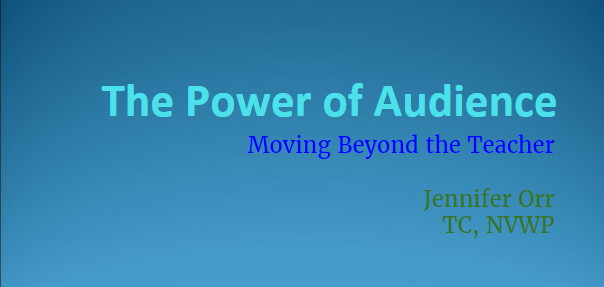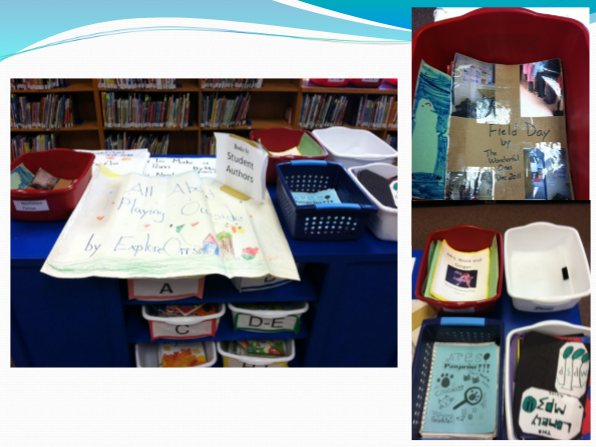The Power of Audience: Moving Beyond the Teacher – NVWP Summer ISI – Day 14
Welcome to the Northern Virginia Writing Project’s 2016 Invitational Summer Institute! I’ll be blogging the demonstration lessons and the various activities occurring during our four-week duration. Find out more about the NVWP and the National Writing Project.
Today’s final demo lesson comes from Jen Orr. She’s going to speak with us about the power of audience!

Quickwrite: In the context of writing, what does audience mean to you?
There is a simple answer: audience is whomever reads/hears your writing. If I am the mouthpiece for something than the audience is the that which receives my message, whatever that message may be.
We share out. Others wisely mention the rhetorical functions and how audience/perceived audience affects the choices we make as writers.
Rapidfire! Quickwrite: Write about a dream or plan for your future. Choose an audience for your writing: yourself, parents, boss, or your best friend.
My plan for the future. Hmm. My goals are all pretty non-specific, something which you’re not supposed to do when making goals. So let’s make them more specific. My plan for the future is to continue teaching at the middle school level. As of now I’m planning to get my National Boards certification. I also want to be published. I want to work on my confidence and do a better job practicing what I preach in terms of self-esteem, confidence, and rationality.
I’m writing for myself, here. Pretty much all of my writing begins here. I was reading a book last night that talked about how we first write-as-writer and then write-as-reader. The former involves following your own train of thought, the stream of consciousness stuff. And then the latter involves going back and making rhetorical choices to make the piece worthwhile and organized for the reader.
We share out. Many of us write to spouses and wives. Jen says writing for an audience is much harder than, say, performing for an audience. Performance gives immediate feedback, whereas the writing process does not. Our audience is contained by our immediate knowledge of that audience. In many cases we know very little about our audience and how that should affect our writing. This is even less so for children, Jen reminds us.
We go into a discussion examining all of the things we write on a daily / weekly basis, and then how our audience for each piece affects our writing. For most of my emails I try not to indulge my more prolix tendencies. What about Facebook? How does audience affect what and how we post? What about Twitter?
Jen tells us that before she taught she didn’t write. Since she entered the classroom, however, she’s written for a variety of sources. We are in awe!
Quickwrite: Write about a way someone has helped you.
Awesome! I love writing about this topic. I’m going to write about Sarah Baker, Our Fearless Leader. She approached after my first Summer Institute and asked if I wanted to be a part of it the following year. She guides me on all aspects of composition. I think it can be so rare in life to find someone who has unyielding faith in you. I’m a pretty quirky guy with a lot of particularities; Sarah is one of the few people who has stepped in to help guide me. She looks past my hyper energy and engages with me on an intellectual level. It’s wonderful and life affirming to have someone so invested in supporting you. She is one of my mentors. My experience working with her has give me confidence that I have something to say that’s worthwhile, and that I have valuable skills to contribute outside of the four walls of my classroom. How powerful it is to see yourself through someone else’s eyes. She has been an indispensable resource during the last few years.
Who was my intended audience? When I was writing it, I started to imagine that I was reading it to her. This made me rewrite a lot of it to try and speak in more global / universal terms.
Jen starts her K-1st graders out writing collaboratively. They then publish the book for the classroom library. She also makes small printouts for each book to give to each author. That way they have a ‘published’ copy of their own writing. It’s easy to move this practice into the secondary level. Her school’s librarian came up with the idea to put Jen’s classroom’s books in the school library. Love this! How powerful it is to have other students pick up and read another student’s writing. The trend then spread to other teachers across the school.

She hangs the writing in the hallway, something I really enjoy doing. They start out as shared letters written to other classes. Jen says after you start doing this regularly, children begin finding audiences themselves. They write to each other, other teachers, family members, and administrators. You can partner with other teachers. Have struggling writers create informational books for younger grades. She has a class blog where every week two kids come and dictate whatever they want to write about the class. Families would share the blog with other family members in other places. Every class had three or four editors that were in charge of approving each post.
Again, we are in awe. I have no excuse not to do more of this in the upcoming school year. This is the final blog post about the Northern Virginia Writing Project’s Invitational Summer Institute’s demonstration lessons. I hope you were able to gain some new ideas from all of the wonderful presentations.
I am so pumped that you do this. ISI 2016 crew has a very detailed log of everything presented. Thanks, Peter. You are the man.
LikeLiked by 1 person
My pleasure, Matt! Thanks for making the blog process so easy for me.
LikeLike